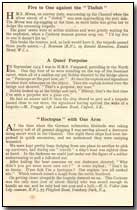Memoirs & Diaries - The Best 500 Cockney War Stories - Five to One Against the "Tinfish" and Other Stories
 Published in London
in 1921, The Best 500 Cockney War Stories
comprised, in the words of its newspaper publisher (The London Evening
News) "a remembering and retelling of those war days when laughter
sometimes saved men's reason".
Published in London
in 1921, The Best 500 Cockney War Stories
comprised, in the words of its newspaper publisher (The London Evening
News) "a remembering and retelling of those war days when laughter
sometimes saved men's reason".
The collection of short memoirs, some 500 in total, is divided into five categories - Action, Lull, Hospital, High Seas and Here and There. This page contains five stories from High Seas, led by Five to One Against the "Tinfish".
Other sections within the collection can be accessed using the sidebar to the right.
Five to One Against the "Tinfish"
H M.S. Morea, on convoy duty, was coming up the Channel when the silver streak of a "tinfish" was seen approaching the port side.
The Morea was zig-zagging at the time, so more helm was given her to dodge the oncoming torpedo.
The guns' crews were at action stations and were grimly waiting for the explosion, when a Cockney seaman gunner sang out, "I'll lay five to one it doesn't hit us."
This broke the tension, and, as luck would have it, the torpedo passed three yards astern.
J. Bowman (R.N.), 19 Handel Mansions, Handel Street, W.C.1
A Queer Porpoise
In September 1914 I was in H.M.S. Vanguard, patrolling in the North Sea.
One day four of us were standing on the top of the foremast turret, when all of a sudden my pal Nobby shouted to the bridge above us, "Periscope on the port bow, sir."
At once the captain and signalman levelled their telescopes on the object. Then the captain looked over the bridge and shouted, "That's a porpoise, my man."
Nobby looked up at the bridge and said, "Blimey, that's the first time I've seen a porpoise wiv a glass eye."
He had no sooner said it than the ship slewed to port and a torpedo passed close to our stern, the signalman having spotted the wake of a torpedo.
M. Froggat, 136 Laleham Road, Catford, S.E.
"Hoctopus" with One Arm
At the time when the German submarine blockade was taking heavy toll of all general shipping I was serving aboard a destroyer doing escort work in the Channel.
One night three ships had been torpedoed in quick succession, and we understood they were carrying wounded.
We were kept pretty busy dodging from one place to another to pick up survivors, and during our "travels" a ship's boat was sighted close at hand. In the darkness we could just make out the figure of a soldier endeavouring to pull a full-sized oar.
After hailing the boat someone on our destroyer shouted, "Why didn't you get some more oars out?"
A voice replied: "Don't be so funny. Dyer fink I'm a hoctopus? Our engines 'ave all conked aht." Which remark raised a laugh from the entire boatload.
On getting closer alongside the tragedy dawned on us. This Cockney was the only man (out of about thirty) who was sound enough to handle an oar, and he only had one arm and a half.
H. G. Vollor (late Ldg.-seaman, R.N.), 73 Playford-Road, Finsbury Park, N.4
Interrupted Duel
The C.O. of my ship had his own way of punishing men who were brought before him for fighting. He would send for the gunner's mate and tell him to have the two men up on the upper deck, in view of the ship's company, armed with single-sticks.
The gunner's mate would get them facing each other, give them the first order of "Cutlass practice" - "Guard!" then "Loose play."
At that order they would go for each other hammer and tongs till one gave in.
Such a dispute had to be settled one day while we were patrolling the North Sea. The combatants were just getting warm to it when the alarm buzzers went - enemy in sight.
The gunner's mate, who was refereeing the combat, said: "Pipe dahn, you two bounders. Hop it to your action stations, and don't forget to come back 'ere when we've seen them off."
Fortunately they were both able to "come back."
John M. Spring (late P.O., R.N.), Bank Chambers, Forest Hill, S.E.23
Enter Dr. Crippen
Our ship, the s.s. Wellington, was torpedoed on August 14, 1917, and we were a despondent crew in the only two boats. The U-boat that had sunk our ship appeared and we were wondering what was going to happen to us.
As the U-boat bore down upon us my mate, Nigger Smith (from Shore-ditch) spotted its commander, who wore large spectacles, on its conning tower bridge.
"Blimey," said Nigger, "'ere's old Crippen!"
J. Cane (late Gunner, R.M.), 73 Rahere Street, E.C.1
Next - The All-Seeing Eye and four other stories
"Toc Emmas" was slang for trench mortars.
- Did you know?
